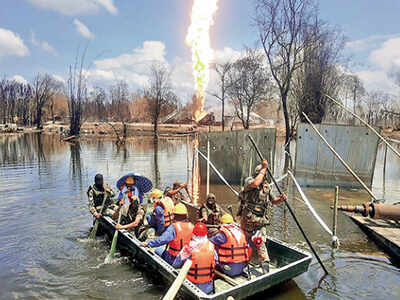
GUWAHATI: The eight-member committee formed by the National Green Tribunal (NGT) stated that a "mismatch between planning and execution" on part of OIL led to the well blowout in upper Assam's Tinsukia district that has caused "extensive damage" to environment, flora, fauna and people residing near the site.
The panel, headed by former Gauhati High Court judge Brojendra Prasad Katakey, was formed on June 24, after OIL's well no 5 suffered a blowout. The panel pointed out three probable reasons for the blowout in the 89-page preliminary report submitted to the NGT's principal bench in New Delhi on July 24.
"There was a deficiency in understanding of the gravity of a critical operation like removal of BOP without having a confirmed and tested secondary safety barrier. There was deficiency in proper planning of critical operations. There was a clear mismatch between Planning and its Execution at site and deviations from the Standard Operating Procedure (SOP).There were serious deficiencies of proper level of supervision of critical operation at well site both from the Contractor (Gujarat-based) as well as from OIL," the report read.
The panel added, "Based on the preliminary assessment to date, the committee is of the unanimous opinion that the Well Baghjan-5 blowout and explosion was preventable."
A team of experts, including six foreign disaster control specialists, is yet to cap the well to douse the massive fire that has been blazing since June 9.
The panel, in the conclusion of the preliminary report, said it was of the "unanimous view" that the Baghjan-5 blowout and subsequent explosion "has led to extensive damage to both the publicly-owned resources", including the Maguri-Motapung wetland and Dibru-Saikhowa National Park, the eco-sensitive zone including the water bodies, air, wildlife and the natural resources surrounding it.
"Additionally, it has caused irreparable physical harm and damage to privately-owned property of the survivors in the affected villages," it said, suggesting compensation, as an interim measure for the affected people.
The NGT panel also pointed out that OIL did not have the mandatory consent to establish and operate under laws of prevention of air and water pollution under Section 21 of the Air (Prevention and Control of Pollution) Act and Section 25 and 26 of the Water (Prevention and Control of Pollution) Act when it first started its drilling operations in Baghjan-5 in 2006.
An NGT bench, comprising Justice SP Wangdi and Justice Siddhanta Das, after hearing separate applications by environmentalist Bonani Kakkar and Assam-based Wildlife and Environment Conservation Organization, on June 24 had formed the panel to look into the matter and submit a preliminary report within 30 days. The next hearing of the case is on Wednesday.
Meanwhile, the recent report by the Wildlife Institute of India (WII), about the blowout pointed out that the blowout caused extensive damage to the fragile ecosystem of the nearby national park with an alarmingly high concentration of cancer-causing, toxic hydrocarbons in the waters "The oil spread out not only on land, but also dispersed into the surrounding rivers and wetlands," said the report, prepared by the team of 27 scientists, researchers, collaborators and field assistants conducted a 360-degree survey, from May 29 to July 7, to ascertain the impact of the disaster on the ecology of the national park and other areas surrounding Baghjan.
The panel, headed by former Gauhati High Court judge Brojendra Prasad Katakey, was formed on June 24, after OIL's well no 5 suffered a blowout. The panel pointed out three probable reasons for the blowout in the 89-page preliminary report submitted to the NGT's principal bench in New Delhi on July 24.
"There was a deficiency in understanding of the gravity of a critical operation like removal of BOP without having a confirmed and tested secondary safety barrier. There was deficiency in proper planning of critical operations. There was a clear mismatch between Planning and its Execution at site and deviations from the Standard Operating Procedure (SOP).There were serious deficiencies of proper level of supervision of critical operation at well site both from the Contractor (Gujarat-based) as well as from OIL," the report read.
The panel added, "Based on the preliminary assessment to date, the committee is of the unanimous opinion that the Well Baghjan-5 blowout and explosion was preventable."
A team of experts, including six foreign disaster control specialists, is yet to cap the well to douse the massive fire that has been blazing since June 9.
The panel, in the conclusion of the preliminary report, said it was of the "unanimous view" that the Baghjan-5 blowout and subsequent explosion "has led to extensive damage to both the publicly-owned resources", including the Maguri-Motapung wetland and Dibru-Saikhowa National Park, the eco-sensitive zone including the water bodies, air, wildlife and the natural resources surrounding it.
"Additionally, it has caused irreparable physical harm and damage to privately-owned property of the survivors in the affected villages," it said, suggesting compensation, as an interim measure for the affected people.
The NGT panel also pointed out that OIL did not have the mandatory consent to establish and operate under laws of prevention of air and water pollution under Section 21 of the Air (Prevention and Control of Pollution) Act and Section 25 and 26 of the Water (Prevention and Control of Pollution) Act when it first started its drilling operations in Baghjan-5 in 2006.
An NGT bench, comprising Justice SP Wangdi and Justice Siddhanta Das, after hearing separate applications by environmentalist Bonani Kakkar and Assam-based Wildlife and Environment Conservation Organization, on June 24 had formed the panel to look into the matter and submit a preliminary report within 30 days. The next hearing of the case is on Wednesday.
Meanwhile, the recent report by the Wildlife Institute of India (WII), about the blowout pointed out that the blowout caused extensive damage to the fragile ecosystem of the nearby national park with an alarmingly high concentration of cancer-causing, toxic hydrocarbons in the waters "The oil spread out not only on land, but also dispersed into the surrounding rivers and wetlands," said the report, prepared by the team of 27 scientists, researchers, collaborators and field assistants conducted a 360-degree survey, from May 29 to July 7, to ascertain the impact of the disaster on the ecology of the national park and other areas surrounding Baghjan.

Coronavirus outbreak
Trending Topics
LATEST VIDEOS
City
 Good news! No Covid-19 death at Delhi's Lok Nayak Hospital for first time in 2 months
Good news! No Covid-19 death at Delhi's Lok Nayak Hospital for first time in 2 months  Covid-19 crisis: 70% of south Delhi eateries fail to renew health trade licence
Covid-19 crisis: 70% of south Delhi eateries fail to renew health trade licence  Mega boost for Indian Air Force: First batch of much-awaited five Rafale fighter jets will reach India by 2 PM
Mega boost for Indian Air Force: First batch of much-awaited five Rafale fighter jets will reach India by 2 PM  Covid-19: Madhya Pradesh minister Tulsi Silawat, wife test positive
Covid-19: Madhya Pradesh minister Tulsi Silawat, wife test positive
More from TOI
Navbharat Times
Featured Today in Travel
Quick Links
Kerala Coronavirus Helpline NumberHaryana Coronavirus Helpline NumberUP Coronavirus Helpline NumberBareilly NewsBhopal NewsCoronavirus in DelhiCoronavirus in HyderabadCoronavirus in IndiaCoronavirus symptomsCoronavirusRajasthan Coronavirus Helpline NumberAditya ThackerayShiv SenaFire in MumbaiAP Coronavirus Helpline NumberArvind KejriwalJammu Kashmir Coronavirus Helpline NumberSrinagar encounter
Get the app



